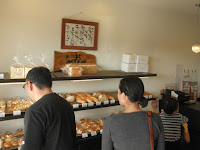
November 28, 2015
Town's small bakeries out to serve for health-conscious people in Japan
 Small
home-made bakeries in Japan are trying to serve products with safer ingredients
following an increase in health-conscious consumers. Many of them use
domestically produced wheat flour amid the "locally
produce, locally consume" campaign.
Small
home-made bakeries in Japan are trying to serve products with safer ingredients
following an increase in health-conscious consumers. Many of them use
domestically produced wheat flour amid the "locally
produce, locally consume" campaign. Happa Nekko (leaves and
roots) Bakery, facing a small but rather busy highway in Chikushino City,
Fukuoka Prefecture, uses wheat flour produced in Kyushu, southwestern Japan, and Hokkaido, northernmost Japan. Its most favored product is Nekko Bread,
a small baquette, but the product is usually sold out past soon.
Happa Nekko (leaves and
roots) Bakery, facing a small but rather busy highway in Chikushino City,
Fukuoka Prefecture, uses wheat flour produced in Kyushu, southwestern Japan, and Hokkaido, northernmost Japan. Its most favored product is Nekko Bread,
a small baquette, but the product is usually sold out past soon."We see the bread sold out frequently, because we cannot bake it a lot," a female employee said. "We can accept reservations," she said.
In Chikuzen Town, also in Fukuoka Prefecture, Haru Bakery attracts families in the neighborhood.
On one Sunday, a couple, accompanied with two small boys, was seen looking for their favorites at the shop.
 The shop is among 13 home-made bakeries selected from the Chikugo
region in the southern part of the prefecture for a tourist campaign "Let's go out to find bakers with much love
for bread."
The shop is among 13 home-made bakeries selected from the Chikugo
region in the southern part of the prefecture for a tourist campaign "Let's go out to find bakers with much love
for bread."A bakery located in a largely rural area in Ukiha City, in the same prefecture, features a fashionable setting and greenery. Chez Sagara, the bakery, has an eat-in service, but customers have to be patient until their buy is baked again to be crisp.
Happa Nekko, or leaves and roots, is named so as it hopes to adapt itself to the local community. "Leaves" denote children who will be leaders in the forthcoming period and "roots" mean adults who support today's society. A wood terrace set up as an eat-in area allows customers to enjoy their time while having a chat. The bakery also provides catering service for town meetings and other events in the community.
Rice has been Japan's staple food over centuries, but domestic rice consumption has been halved from the 1960s to the 2000s following a series of changes in Japanese people's eating habits.

 Bread began to be widely eaten in Japan around the 1970s, particularly among young people in urban areas. The spread of bread-eating habit also can be linked to the theory that excessive intake of rice may be unfavorable to health. But the consequence was a steady increase in Japan's wheat imports over the past decades. At present, Japan relies on imports for 90 pct of its wheat consumption.
Bread began to be widely eaten in Japan around the 1970s, particularly among young people in urban areas. The spread of bread-eating habit also can be linked to the theory that excessive intake of rice may be unfavorable to health. But the consequence was a steady increase in Japan's wheat imports over the past decades. At present, Japan relies on imports for 90 pct of its wheat consumption. Japanese consumers are becoming more aware of the importance of domestic farm produce from a point of view of securing food security and ensuring food safety.
Japanese consumers are becoming more aware of the importance of domestic farm produce from a point of view of securing food security and ensuring food safety. The "locally produce, locally consume" movement is aimed at not just encouraging domestic consumption of domestic products but also mutually linking growers and consumers so that they can better understand each other and think about truly healthy foods.
The "locally produce, locally consume" movement is aimed at not just encouraging domestic consumption of domestic products but also mutually linking growers and consumers so that they can better understand each other and think about truly healthy foods.Small bakeries across Japan should continue to serve customers with various products just out of the oven, helping to bind people together in the community.

